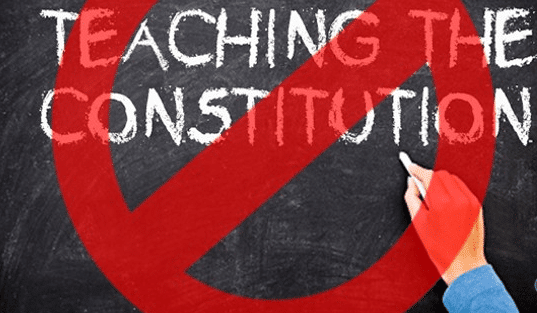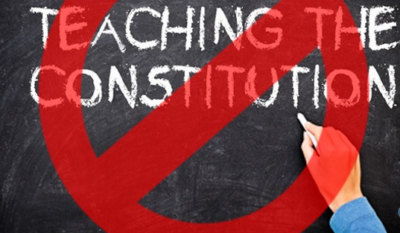The Batavia, Illinois school board has decided to punish teacher John Dryden with a letter of remedy simply because he stood up for the Fifth Amendment rights of his students. This letter details probationary actions he must complete or else face more disciplinary action. Hundreds of current and former students, as well as parents, are rallying in support of the history teacher.
The problems first arose for Dryden when he found student surveys in his mailbox at school a few minutes before his first class of the day at Batavia High School. Unlike prior surveys distributed by the school district, these forms had the students’ names at the top of the page. The completed surveys would be reviewed by psychologists, social workers, counselors, and school officials. After reading the 34 questions on the page, the Illinois teacher decided that the students needed to be reminded that they had the right not to incriminate themselves.
Dryden had just finished an instructional unit on the Bill of Rights with his students. The Batavia school survey was created by Multi-Health Systems, a private company. The district maintained that the questions on the survey were proprietary business information and refused to share the contents of the form when asked to do so by local media outlets.
The Illinois teacher noted that he made a judgment call when opting to respect the rights of the students. Dryden also stated that if the surveys had been presented to teachers at least a day prior, he would have had the time to share his concerns with district administrators. Dryden believes that a fellow teacher, who had difficulty getting students to complete the surveys, told the administrations about the Fifth Amendment reminder to students.
The Batavia High School teacher does not want the media attention to become a teacher vs. school administration fight. He believes the school officials are “good people” who want to do right by the kids. Dryden had this to say about the survey and the possible reprimand stemming from the Fifth Amendment reminder:
“I think I am a sideshow. I have asked people [supporters] to talk about the survey. This was rushed and it wasn’t vetted. I’m not a martyr. I’m trying to refocus people’s attention. Somebody needs to remind them [students] they have the ability not to incriminate themselves.”
Parents of the minors were informed about the information their children were being asked to provide to school officials before the surveys were handed out. An email sent to parents stated that students could opt out of the survey, but that notification of such a decision must be submitted to the school district by April 17. Parents who could not afford a computer or the Internet likely did not even receive the email communication about opting out of the survey.
The school maintains it was using the survey about student habits and emotional states, not as a diagnostic tool, but as a “screener.” Batavia school Superintendent Jack Barshinger stated that teachers began supporting the idea of such a questionnaire after “several suicides” occurred in “recent years.” Student responses theoretically would serve as at-risk behavior indicators to preclude potential problems down the road. “We can’t help them if we aren’t aware of their needs,” Superintendent Barshinger told the local media.
School district officials and teachers are extremely naïve if they think more than a few (if any) teenagers are going to answer questions about tobacco, alcohol, and drug use truthfully. When Billy the class clown answers the survey questions, his responses will likely land him in the psychologist’s office for multiple sessions. Even the more serious students will probably be too fearful of getting into trouble at school or with parents to give honest survey responses.
The tobacco, alcohol, drugs, and emotions survey was administered to show how the students are achieving the “social-emotional learning” standards set by the state of Illinois. The academic achievements of American public school students are at an all-time low, but educational officials apparently feel confident enough in their abilities to direct and judge the social and emotional health of the children.
The Illinois Department of Education should not be venturing outside the academic realm and intruding on the authority of parents. John Dryden’s Fifth Amendment lecture was completely justified. The students deserved to know that they could not be mandated to provide evidence against themselves or be forced to share private information. Parents who did not get a note to school by the designated date essentially forfeited not only their rights, but their child’s as well.
An excerpt from the Illinois Learning Standards Social – Emotional Learning (SEL) section reads:
“These standards have been developed in accordance with Section 15(a) of Public Act 93-0495. This Act calls upon the Illinois State Board of Education to develop and implement a plan to incorporate social and emotional development standards as part of the Illinois Learning Standards.”
State Mandated Standards Goals
- Develop self-awareness and self-management skills to achieve school and life success.
- Use social-awareness and interpersonal skills to establish and maintain positive relationships.
- Demonstrate decision-making skills and responsible behaviors in personal, school, and community contexts.
While the goals themselves are examples of positive behavior, it is the parents who should teach and judge such actions, not the state. If a student notes, either honestly or for a lark, that they smoke pot and drink beer after the football game, or share information about emotional struggles, that information could be used against them not only in court, but when applying for college, the military, a job, or when seeking to purchase a gun.
The law recognizes that a 16- or 17-year-old is not mature enough to sign a legally binding contract, vote, or get married. The Illinois Department of Education therefore should not assume that a teenager can comprehend the consequences of answering intrusive survey questions. Asking a teenage girl about her emotional state on Monday morning after a weekend argument with her boyfriend or best friend would surely garner different responses than if the same questions were posed on another day. The “everyone hates me” style responses would set off alarm bells unnecessarily with school officials. The same girl who thinks she has no friends on Monday morning could be having the best day ever by lunchtime.
Survey answers from students who did not realize they had the right to refuse to share the information have already come under review by school officials. The subjective nature of the interpretive process is yet another scary aspect of the government overreach present in the Illinois public school system.
The outpouring of support and online petitions to keep John Dryden from being punished for respecting the Constitution could prompt other teachers, students, and parents to reconsider their willingness to behave like sheep, toss away their freedoms, and put pen to paper whenever the state instructs them to do so. The Illinois survey, Common Core, and similar attempts to influence the social (and perhaps political) mindset of students while usurping parental authority is a very disturbing trend, and possibly why the homeschool population is growing by leaps and bounds.












